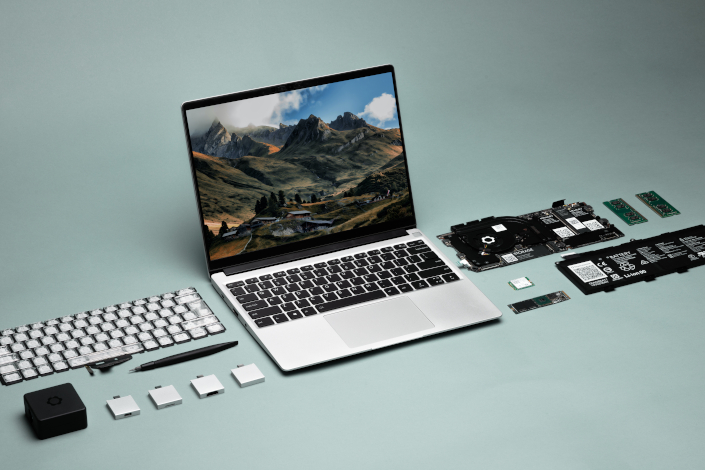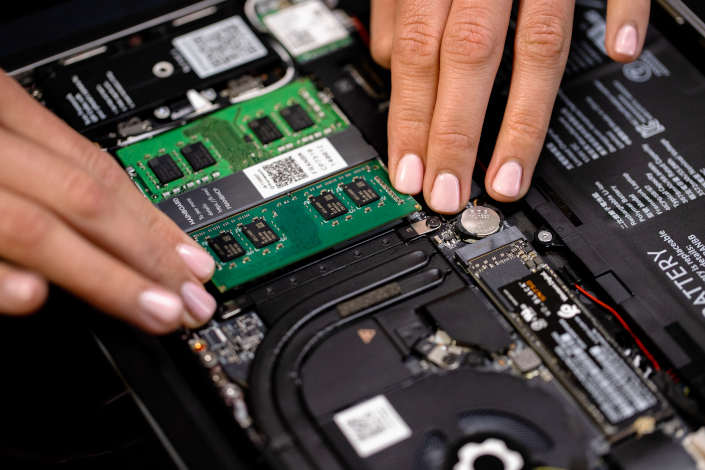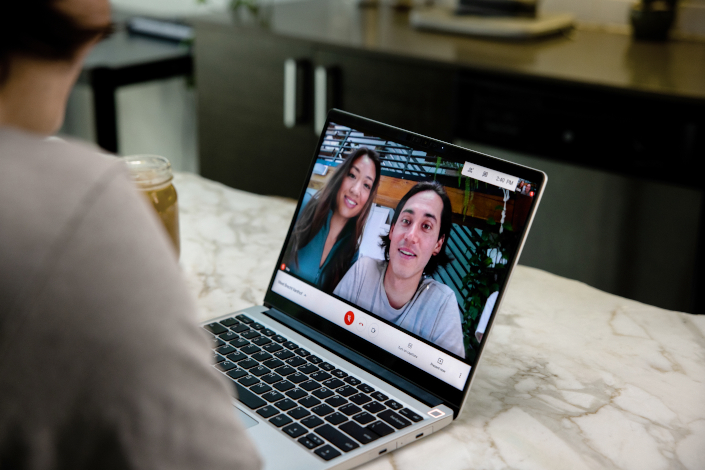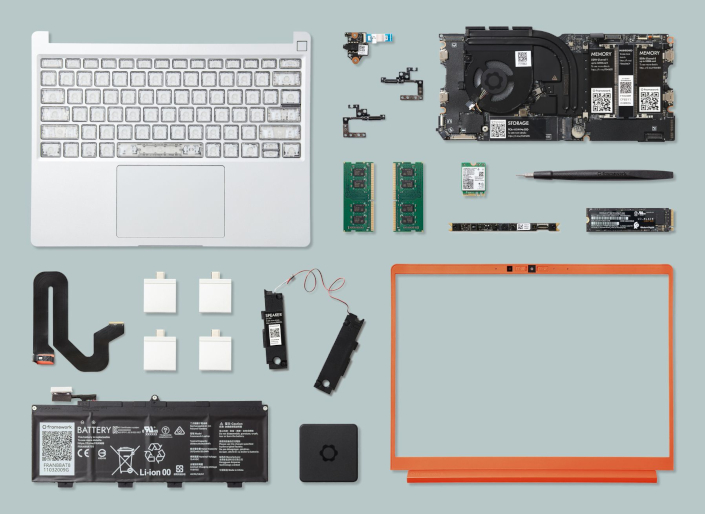Nirav Patel, the founder and chief executive of the Framework consumer electronics firm, may well turn out to be the person who commoditises the laptop industry. When the first laptops emerged in 1984 — and forever thereafter, no matter the brand — the only parts that could be replaced were the hard drive (or SSD or NVME nowadays) and the memory.
In some cases, even that was not possible unless one bought again from the same manufacturer – who used lock-in to make money. And now with Apple leading the trend of soldering memory to the motherboard, one is stuck with the memory configuration which one bought at the start – unless one is willing and able to buy a brand new overpriced Apple laptop.
Patel builds what he calls "simple and minimal" laptops, starting from a base to which consumers can add the modules they want. Those who do not need an operating system do not need to pay the Microsoft tax; they can buy and then run whatever they want. True, people will have to buy modules from him again whenever a part dies or the owner wants a replacement - but one avoids paying for the whole caboodle again. And if his laptops keep selling as well as they have, then I'm willing to bet that a grey market will arise (probably in Shenzhen, China) to undercut him.
|
|
Patel says he chose this path "deliberately to position the upgradeability, repairability, and overall mission as the differentiator, rather than the industrial design, and also to prioritise having a design that is more 'timeless' to enable longevity, rather than bringing in design flourishes that could become dated".

Framework produces neat laptops. Supplied
Framework recently raised US$17 million (A$26.2 million) in a funding round. Patel is unwilling to say whether his firm will branch out into other products, but given his personality type, one can hazard a guess that he will decide on products only after much thought.
Framework first built a 13-inch laptop. Now Patel has added a 16-inch model.
Judging from the way he expresses himself, Patel is not the typical Silicon Valley narcissist who is full of himself and willing to sell any kind of junk as long as it makes money. His products are more down-to-earth and he aims to be around for a long time. Of course, he wants to make money, but what he offers in return will have value.
He was interviewed by email.
I assume that being a Patel, you are from Gujarat, the same state as the Indian Prime Minister Narendra Modi. Have your origins had any impact on the course you chose to study?
I was born in the US and have spent essentially all of my life here. What I did carry in from my roots though is the immigrant mindset of self-improvement, work ethic, and driving the change you want to see.
What personality type are you?
Myers-Briggs says that I'm INTP, but I think "indefatigable" is a closer definition of my personality.
What do your parents do? Did their occupations have any influence on the course you finally took? Family members?
My parents were immigrants to the US, and my dad was/is an electrical engineer. This was certainly a direct influence on me, since my parents encouraged and fed my curiosity about the world and how things work.

The innards of a Framework laptop. Supplied
At what age did it come to you that starting your own company was the best way to realise your dreams? I take it that you were not exactly unhappy at Oculus, Facebook or Apple.
I was fortunate to be the eighth person to join Oculus, which let me see first-hand just how much a small group of people aligned to a common mission and vision can accomplish in a short period of time.
Several years into our acquisition by Facebook, I saw just how much we were slowed down by big-company bureaucracy, and I knew that I needed to start my own company to be able to solve important problems with urgency.
What factors annoyed you at these three companies?
Noted above on Facebook. One of the biggest issues with Apple is just how strictly teams and individuals are siloed from each other. This results in not just an unpleasant working environment, but worse products than the company could otherwise build.
What was your experience like with OLPC? I ask because I consider it a wasteful project that wasted a lot of time and money and achieved nothing.
I participated in OLPC through Google's Summer of Code, writing a webcam interface library. OLPC was massively influential in being able to approach computing from a blank slate and create a path for it to be much more accessible from a cost standpoint than anything that was available prior to its creation.
The unfortunate flip side to that, though, was that there was a lot of infrastructure, technology, hardware, and software that was created specifically to enable OLPC that came from a place of academic and philosophic ideals, rather than from the practical realities of what would allow for a deployable, scalable, maintainable solution.
For example, although the Sugar operating system was really theoretically interesting, very few developers created applications for it because the environment was pretty different from any of the other platforms that they could develop for.

A clean interface is a distinguishing feature of the Frameworkd laptops. Supplied
Coming to Framework, how many staff do you have working under you?
We have a team of 50 people here.
What kind of management style do you adopt – making most decisions yourself (the way Charles Simonyi did at Microsoft, calculating that if he was right 85% of the time all would be fine) or do you delegate decision-making?
This is always a careful balance. I'm a firm believer in 'doing things that don't scale' for early stage start-ups, but also in identifying individuals in the team who have significant growth potential and empowering them early with ownership and decision making.
Your laptops look very much like Apple's hardware. They look clean and neat as well and I'm guessing that these traits are very much part of your personality. Correct?
Our laptops, especially Framework Laptop 13, are deliberately simple and minimal from a materials and industrial design standpoint. We (our head of Industrial Design, Nick, and I) chose this path deliberately to position the upgradeability, repairability, and overall mission as the differentiator, rather than the industrial design, and also to prioritise having a design that is more 'timeless' to enable longevity, rather than bringing in design flourishes that could become dated.
Cost-wise, the Framework laptops are prohibitive, at least in Australia. I configured one for myself and the cost came to $3600+ My current laptop, a Lenovo Thinkpad, cost me $1024 and will complete 10 years in June. Given my usage, would it really be cheaper for me to buy from you or pick up a Lenovo unit every decade?
Our pre-built Framework Laptop 13 starts at AU$1,689, which is lower than the starting price for the lowest end MacBook Air or Dell XPS 13. Every individual and business ultimately needs to make their own decision based on what they are looking for in a computer.
We've prioritised building a high-performance computer with a great display, keyboard, webcam, and other functionality that is also designed to last. The sales traction we've seen suggests that this is resonating with a large number of consumers and businesses.

"A high-performance computer with a great display, keyboard, webcam, and other functionality that is also designed to last." Supplied
Of course, the parts on the Framework machines would be of much better quality that those on the Lenovo machines. The DVD drive, headphone socket and some keys on my ThinkPad no longer work and if I want replacements I will have to probably buy huge parts of the machine. Have you calculated how much saving one can make by buying from you?
This ultimately depends on the what each individual is looking for out of a computer. Someone who is always looking for the latest and greatest performance would get cost savings over alternatives by being able to replace just the Mainboard every two years rather than picking up a full new laptop.
On the other hand, someone who has very minimal performance needs may only need to replace something like a battery every four or five years and be happy to continue using their laptop for longer.
How do you plan to use the new funding (US$17 million) which you announced recently? Any phone in the wings? Any tablets? Or are those spaces far too crowded now?
We're not sharing the specific categories we're entering, but our philosophy is to continue to go into mature spaces and build products that solve longstanding problems. We're also continuing to support and scale the categories we already operate in.
What is the fundamental principle that drives you? I mean, why do you get up and go to work every day?
Ultimately, I'm driven by the desire to succeed in our mission to remake consumer electronics to respect people and the planet. That is the long term principle that fuels me, while day to day, I'm excited to work with the amazing team we've assembled and solve interesting challenges on the path of building and scaling our products.
Do you plan to study further or attend any courses/engineering workshops to improve your understanding of your product? If so, where?
I spend a lot of time learning from our team members, who are world-class experts in their fields.
Final words – what would you like people to remember you for?
Ultimately, I would like people to remember me not just for solving an important problem or for shifting an industry, but for doing so with a healthy and happy team. It's often the case that world-changing companies are full of totally-avoidable chaos, and so I want to avoid that chaos.













































